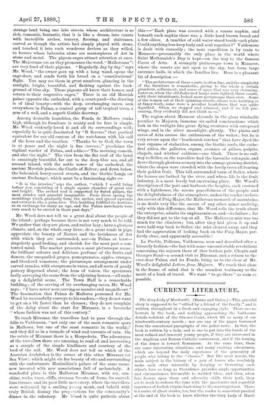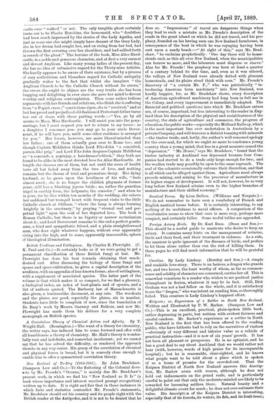CURRENT LITERATURE.
The Grey Lady of Hardcastle. (Burns and Oates.)—This graceful story is supposed to be "edited by a friend of the family," and is written throughout in a fresh and engaging style. There are no horrors in the book, and nothing approaching the loathsome details redolent of the Divorce Court, which fill so many of our nineteenth-century novels ; nor are any of the pages borrowed from the sensational paragraphs of the police news. In fact, the book is written by a lady, and is one to put into the hands of the most refined and innocent young people, if they are interested in the Anglican and Roman Catholic controversy, and if the leaning of the donor is toward Romanism. At the same time, there are some interesting situations, and many exciting adventures, which are beyond the daily experience of the generality of people who belong to the " classes." But like most novels, the main subject is the history of a pair of lovers who resolutely make each other miserable by denying or thwarting each other's love so long as Providence provides ample opportunities and circumstances favourable to wedded bliss ; and then, when fate frowns upon them and adversity chills their path, they set to work to redeem the time with the passionate and regretful eagerness of foolish virgins hastening to the marriage feast. There is a series of ghost stories, too, but the reader is somewhat puzzled at the end of the book to know whether the Grey Lady of Hard-
castle ever " walked " or not. The only tangible ghost certainly turns out to be Phoebe Hutchins, the housemaid, who " doubtless had been much impressed by the stories of the Lady Agatha, and just as some one else might simply have dreamt of the Grey Lady, she in her dream had sought her, and on rising from her bed, had thrown the first covering over her shoulders, and had sallied forth in search of the ghost." The heroine of the book, Miss Alice Hard- castle, is a noble and generous character, and at first a very earnest and devout Anglican. Like many young ladies of the present day, she has no idea of submissive regard for the Thirty-nine Articles. She hardly appears to be aware of their existence, but by a process of easy aestheticism and blameless regard for Catholic antiquity gradually wakes to the fact that whilst she imagines " the Anglican Church to be the Catholic Church without its errors," the errors she ought to abjure are the very truths she has been hugging and delighting in ever since she gave her mind to devout worship and religious contemplation. Then come rather tedious arguments with her friends and relations, who think she is suffering from "a Popish craze ;" convictions ripen, she is "received," and at last her proud and prejudiced old-fashioned Protestant father turns her out of doors with these parting words :—" Yes, go by all means to Mass, Miss Hardcastle. I will assist you into the pony- carriage, but I must request you not to return to my house : as a daughter I renounce you : you may go to your uncle Dover- court, if he will have you, until some other residence is arranged for you." Her lovers, however, are more liberal-minded than her father ; one of them actually goes over to Rome too; and though Captain Middleton thinks Lord Fitz-John " a conceited, parson-like prig," and Lord Fitz-John despises Captain Middleton as "a coxcomb, a popinjay, a hairdresser's-block," they both are found to be alike in the most devoted love for Alice Hardcastle. At length she chooses one of them, but not until the roses of health have all but faded away from the tree of love, and nothing remains but the thorns of trial and premature decay. Her dying husband, as he gazes upon the loveliness of his wife, " feels almost awed ; she is no longer the childish playmate of former years, still less a blushing joyous bride ; no, rather the guardian angel in earthly form, the helpmate, the consoler ;" and when he is gone, for he dies within ten months of the wedding, she solaces her saddened but tranquil heart with frequent visits to the little Catholic church at Oldham, " where the lamp is always burning brightly in the sanctuary," by praying " eternal rest and per- petual light" upon the soul of her departed love. The book is Roman Catholic, but there is no bigotry or narrow sectarianism about it; and Lord Dovercourt remains to the end a perfect gentle- man, a kind and sympathetic friend, and a plain straightforward man, who does right whatever happens, without ever apparently rising into the high, and to some, apparently inaccessible, sphere of theological illumination.



































 Previous page
Previous page